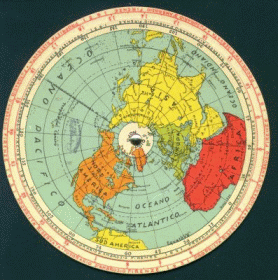Quirico Filopanti (continued)
It is not by chance that Filopanti's success came after death. He was only re-evaluated out of respect for the rites of the post-Risorgimento tradition, although esteem for him was purely local and regional: he became the "powerful, original mind (if not altogether calm and ordered)" who, almost single-handedly, brought honour to the astronomy circles of Bologna in the 19th century.
 |
|
| Fig. 1:
"D'Ambrosio
Time Zones”. Conceived in 1929. According to the review in the Scuola Italiana
journal, it would allow for the "quick and precise calculation of the time
in any country in the world". (Credit: Biblioteca 'Guido Horn d'Arturo' del Dipartimento di Astronomia dell'UniversitÓ degli Studi di Bologna) |
At any rate, Filopanti belongs to the group of people who were the protagonists of the Italian nineteenth century. He was a Risorgimento hero, Garibaldi's "professor of the infinite", a member of parliament dedicated to the fight for better social conditions, and a great scientific popularizer, especially as far as astronomy was concerned.
Filopanti's conferences, often held outdoors so that the public could see the sky he was describing, were a fascinating attraction. He spoke to "the scientifically non-educated" but also added "radically new things" to which he called "the attention of the professional scholars". His sky was populated by an infinite number of planets "provided with all the conditions necessary for inhabitation", and by stars and nebulae which formed the Cosmos, where the Milky Way was a "central, fundamental and principle part". The Cosmos was surrounded on all sides by a desert, and beyond that there were other Cosmos, the light of which could not reach us because of a lack of an interposing ether. His Universe was infinite and eternal, animated by a free and intelligent force which orders and guides, a Universe full of cosmic harmonies, astral influences, connections with man. In this context, science's job was to guide the material, civil and moral progress of the people in order to create a "universal republic" which coincided with the universe itself and repeated the harmonies of that universe.
Apart from drawing up theoretic
constructions founded on abstract universal principles, which brought him fame
as a "visionary", Filopanti also devoted himself to inventing implements
intended to solve everyday problems, especially in order to reduce the worker's
load and "produce more to eat more": for example, a steam plough system, a
drainage project in the Roman Plain and a system of aquaducts in the countryside
of Ferrara. Unfortunately, apart from his time zones, neither his projects nor
his visions were ever put into practice.
|
|
(Quirico
Filopanti - page 4 of 4)
< Back | |